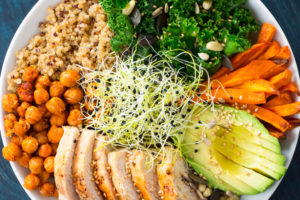Does what you eat affect your fertility?

The straight answer is, yes. Absolutely. There is enough research now to definitively say that your diet significantly affects your ability to conceive and carry a healthy pregnancy.
Essential nutrients for men
For men, new sperm are constantly being made. Essential nutrients such as zinc and omega-3 fatty acids are directly involved in sperm production. Over the following 3 months, sperm mature and develop and need to do so under the protection of antioxidants. Zinc plays a further role here, as does selenium, vitamin C and vitamin E to name the big players. We’ve all heard that the ‘Western Diet’ is bad for us. But even if you are not eating pizza and soda every day of the week, a large number of our patients are low in these critical antioxidant mineral and vitamins.
Not getting enough – or do you just need more than the next person?
The reasons are different for everyone, perhaps there just isn’t enough colour on that plate at lunch or dinner. Opting for brightly coloured fruits and vegetables can increase your intake of antioxidants. Or is it something more specific to you; your lifestyle is very demanding or you are in contact with a high degree of pollution or other environmental stressors. Underlying inflammation, even mild, can also have a huge impact on your antioxidant reserves. Seemingly innocuous conditions like asthma, eczema or psoriasis are very common in Ireland. All of these things can put demands on your antioxidants, leaving little left over to protect your sperm. This can affect sperm count, quality and even the quality of the precious DNA cargo that it is carrying.
Protecting your eggs
While we know that women are born with all of the eggs they will ever produce, we can still protect them as they mature, getting ready for ovulation. This also takes place over the course of 3 months. During this time, eggs also need protection from antioxidants. If you are trying to conceive at an older age, over 35 or even 40, egg quality is often a major concern. Even if you don’t have time to wait around, any dietary and lifestyle changes you make now will improve your chances and help to ensure a healthier pregnancy also.
The fertility friendly diet
Research shows us that people who have diets high in fats, trans fats (the really bad ones in crisps, biscuits and fried foods), sugars and processed foods are more likely to suffer from reduced fertility and miscarriage. A good fertility friendly diet is high in fruits, vegetables, and high fibre foods such as complex carbs and pulses. Red meat can promote inflammation where omega-3 rich oily fish is powerfully anti-inflammatory. Sparing the precious antioxidants by promoting an anti-inflammatory environment is especially helpful. We recommend reducing to one portion or less of red meat per week and increasing your fish intake and trying to incorporate some vegetarian meals weekly. For further suggestions, check out our meal plans and recipes for Sims IVF here.
Want to know more?
Come join us at these fantastic info talks in Dublin and Galway.
Dublin Saturday 6th October , book here
Galway Monday 8th of October, book here

